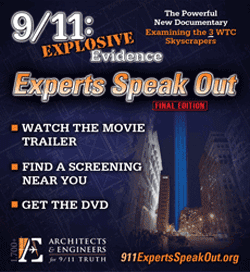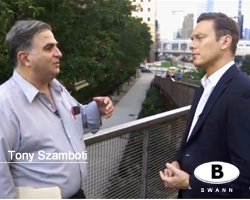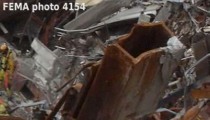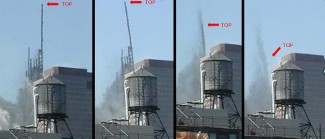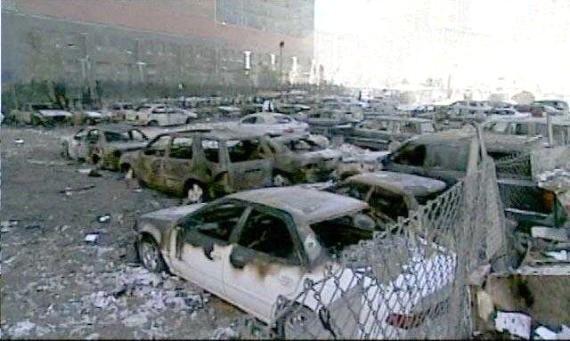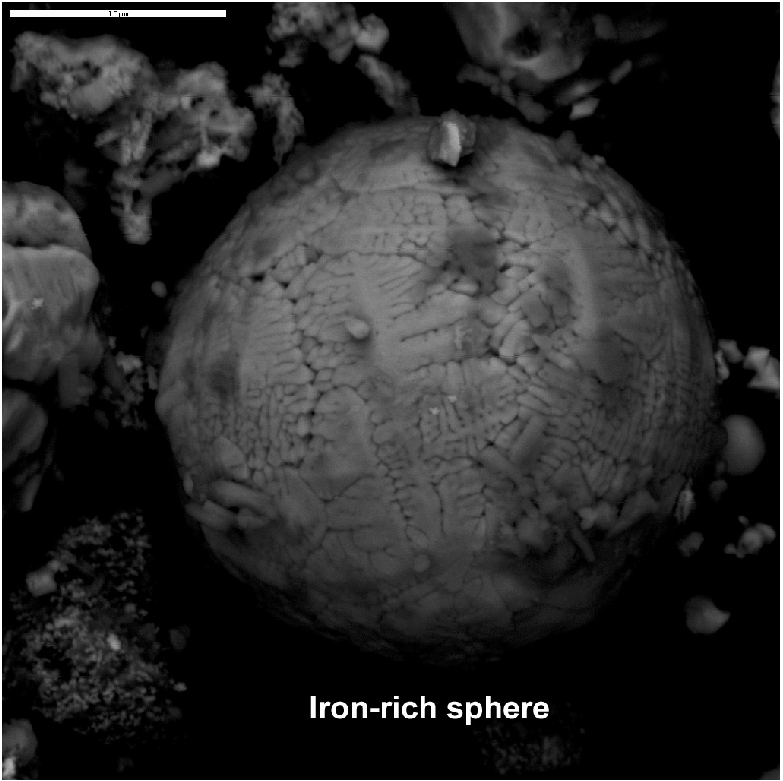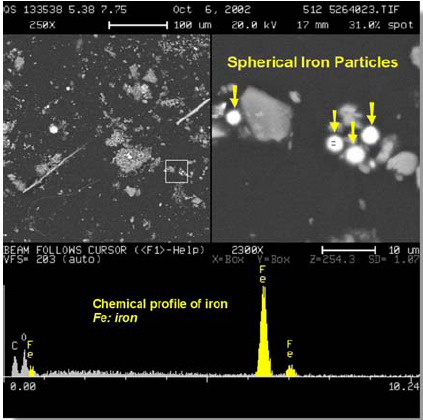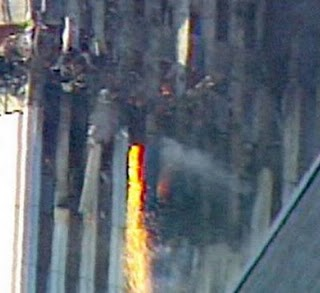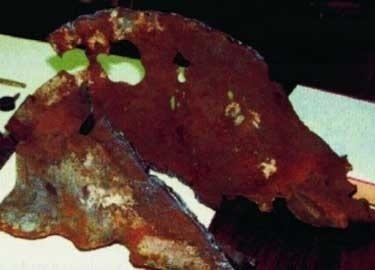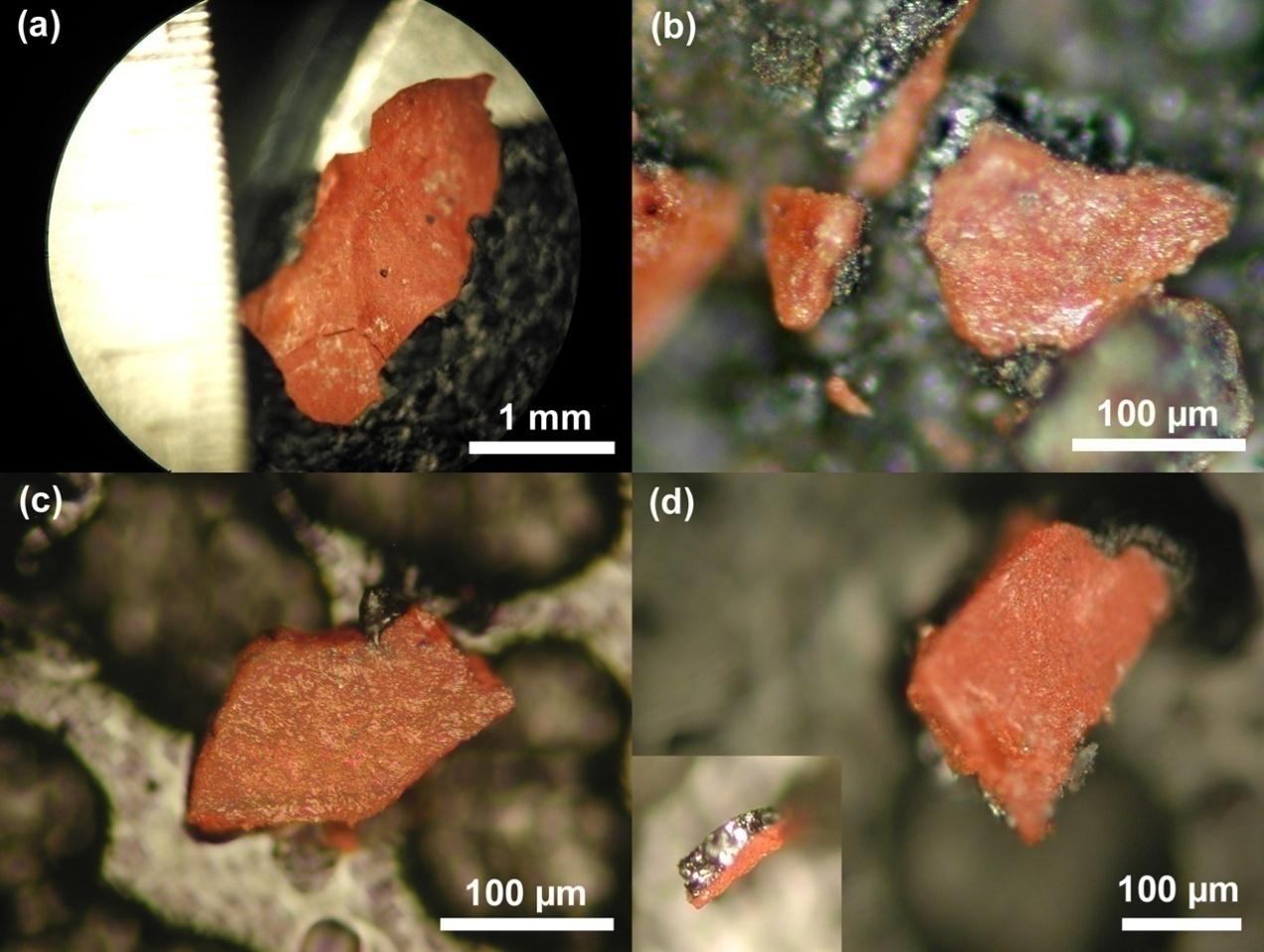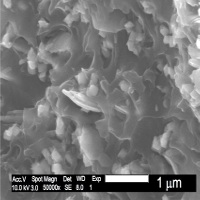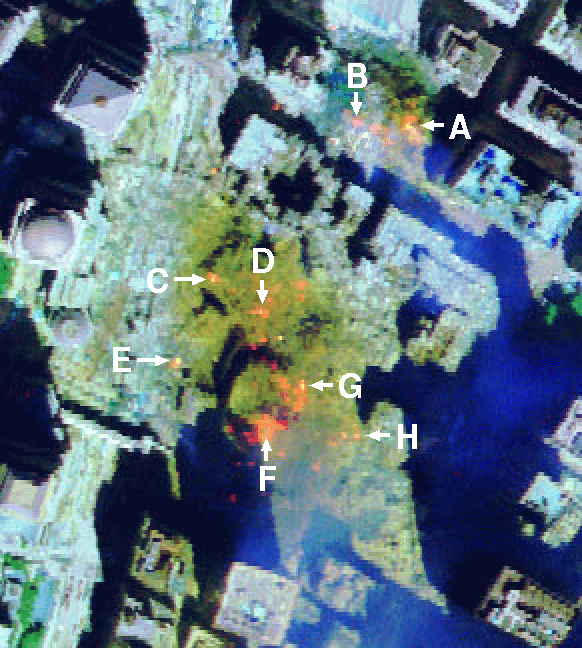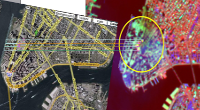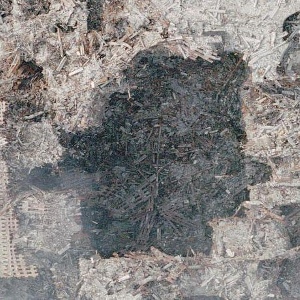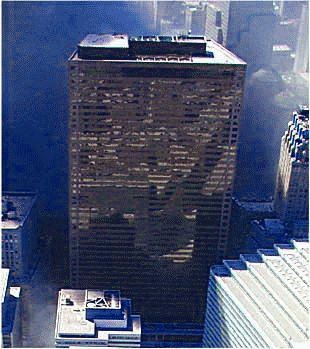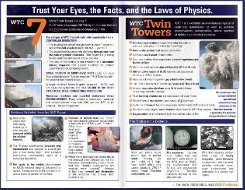| FAQ #3: What’s Your Assessment of the Directed Energy Weapon (DEW) Hypothesis? |
 |
 |
| Written by Jonathan Cole, P.E., Richard Gage, AIA, and Gregg Roberts | ||||||||||
| Sunday, 18 May 2014 05:00 | ||||||||||
|
Some have suggested that much of the structural steel of the World Trade Center skyscrapers was turned to dust, or "dustified" – a term used by Judy Wood, the primary proponent of this hypothesis – with some type of directed energy weapon (DEW). Some of the observations cited by Wood include the voluminous dust created during the Twin Towers' destruction, the "craters" in WTC 5 and 6, "toasted" cars, and small holes in glass windows. While Wood and AE911truth agree that the official story of an "inevitable" collapse by gravity alone is impossible because it conflicts with laws of physics, we completely differ on the mechanism of the destruction. Crucially, once there is proof and consensus that the official story violates elementary laws of physics, our major scientific task has been accomplished. The remaining task is the political challenge of mobilizing support for a legitimate investigation. Of course, the science of the collapse of the Twin Towers and Building 7 can be advanced beyond the mere conclusion that the official story must be false, but it is imperative that anyone seriously advancing understanding of the mechanisms of collapse hew closely to scientific methodology. This is crucial to earn the 9/11 Truth Movement the public respect it deserves, rather than to cast it into the role of perpetrating "junk science." The scientific method requires us to look at all the available evidence and then assess various explanations for their ability to account for the evidence. At some point, just as in pure science, the inferior explanations must be discarded if there is to be continued progress in an investigation. It is our opinion that the DEW hypothesis is not just weak; it is not supported by the evidence at all. We provide only a general discussion here, referring the reader to references for a thorough understanding. A Hypothesis in Search of Facts One of the observations that seems to have motivated Wood to come up with her directed energy weapon hypothesis is that the debris pile at Ground Zero does not seem to be tall enough to contain enough steel to equal what was in the Twin Towers before they came down. She departs from verifiable fact quite early with this claim. FEMA, the Federal Emergency Management Agency, performed the first technical review of what brought down the Twin Towers and WTC 7. Even in its report, FEMA acknowledges (inconveniently for the official story, which cannot account for this fine destruction of the Twin Towers) that roughly 90% of the Twin Towers' mass fell outside their footprints. Indeed, the entire plaza was covered with steel pieces and assemblies. Some of the structural steel was thrown as far away as the Winter Gardens – 600 feet. Given all this, there is no reason to expect a taller debris pile at Ground Zero than the photographs show. Wood's belief that some of the steel must have been turned into dust rests on a completely spurious interpretation of the visual evidence. Her hypothesis is an attempt to solve a nonexistent problem. As we will show, it can be sustained only by additional poor analysis and leaps of faith, just as in the official explanation. Damage to Core Box Columns
• Be capable of a sufficiently sharp focus for it to attack all or most of the columns at a given level at the same time, but only the ends of those columns; • Be capable of having its target level move down the building without changing the angle at which it cuts the columns; • Be capable of having its target level move down at two-thirds of free-fall acceleration (as measured by David Chandler), and perhaps other acceleration rates; • Be capable of having multiple target levels, so that it could destroy the falling upper section of each tower while also destroying the lower section, to create the illusion that the upper section is crushing the lower section, even though that upper section is in itself being destroyed; and • Be capable of destroying only those connections between steel columns that still form part of the buildings' structures, leaving untouched the hundreds or thousands of steel assemblies and steel pieces that can be seen flying out of each tower both within and outside of the huge clouds. In addition to all these features, Wood's alleged secret DEW technology would have had to be able to pulverize most of the 180,000 tons of concrete in both Towers, and Building 7, and in the case of the Twin Towers, eject 90% of the buildings' mass outside their footprints. Such technology would also have to be able to account for the evidence relating to molten iron, nano-engineered energetic material, and the sights and sounds of explosions as described below. Why posit sophisticated secret technology to explain these observations, when some combination of thermitic incendiaries and explosives placed throughout the buildings can explain them much more simply, and without making wild assumptions? This is a clear violation of Occam's Razor, which says that the simplest explanation that accounts for all the facts should be given the greatest credibility. In fact, the destruction of the Twin Towers matches fully the characteristics of "high-order damage" as they are listed in the NFPA 921 Guide for Fire and Explosion Investigations: All three WTC skyscrapers were completely destroyed; the structural units (perimeter walls, etc.) were shattered; heavy pieces from the Twin Towers were thrown horizontally at 70 mph over large distances; and most of the concrete floors were finely pulverized. That the common concept of high-order damage is met by the evidence at the WTC means that explosions with a high rate of pressure rise occurred. The use of high explosives can explain all the evidence that matches the characteristics of high-order damage. The case for explosives is also supported by over one hundred orally recorded accounts by FDNY first responders, many of whom reported sounds of explosions and patterned flashes of light, and by many interpreting the skyscraper destruction as being caused by "secondary devices."
Also, if the structural steel was "dustified," one would expect to see at least some evidence for partially "dustified" steel members in the debris, yet nothing of the sort is shown in Wood's book or website. One would also expect a much higher fraction of the dust to be consistent with iron-rich material than the 5.87% maximum of iron-rich spheres detected by RJ Lee Group (RJ Lee; see below). The massive structural steel frames of the Twin Towers (100,000 tons each) were roughly equal to the mass of concrete in the towers. Since the proportion of concrete powder in the dust was found to be up to 30%, one would therefore expect a similar percentage of "dustified" steel, but none has been found. The “toasted” tops of vehicles
Partially unignited thermite, thermate, and/or nano-thermite falling through the air as it continued to react would have produced molten iron droplets. A still-reacting thermitic mixture drifting down onto the cars in the dust plumes could easily account for the singeing of their paint and even igniting the cars (since the highly exothermic thermite reaction can quickly reach temperatures exceeding 4000 °F). A reporter and a firefighter (see the last two links at the end of this article), and perhaps others, described the dust cloud as feeling hot – whereas Wood claims that the dust clouds were cool. Once-molten iron microspheres found in the dust Substantial quantities of once-molten iron spheres, up to 150 times the background level of iron in dust from other buildings in the area, were found and documented by the US Geological Survey (USGS) and The RJ Lee Group. RJ Lee found the microspheres in amounts up to 6% inside the skyscraper across the street from WTC 2. Other scientists estimate a total of 10 tons to 100 tons of microspheres altogether throughout Lower Manhattan. These spheres were so plentiful that RJ Lee used them as a "signature component" of the WTC Dust, and the EPA discussed their use as signature markers. RJ Lee notes that the microspheres were "created during the event," that is, they were not created by welding operations during the cleanup of Ground Zero. The once-molten state of these microspheres indicates that they were created by temperatures hot enough to melt iron. Office fires and jet fuel fires, which do not produce such high temperatures, could not possibly have produced them.
The chemical signature of the examined spheres matched the chemical signature of spheroids produced by common thermite and by red/gray nano-thermite composite chips found in the WTC dust, indicating that thermitic reactions took place as part of the towers' demise. The DEW hypothesis does not address this and cannot account for it because it is inconsistent with the extreme heat required to produce it.
FEMA's Building Performance Assessment Team report, May 2002, Appendix "C" documents molten iron invading the grain boundaries of the WTC structural steel. A revealing New York Times article called this "the deepest mystery" of the investigation.
Active, unignited nano-thermite found in the dust An international research team found nano-engineered thermite, or "nano-thermite," in each of the four samples of dust examined as part of a peer-reviewed study. Nano-thermite, also known as super-thermite, was developed in US national laboratories in the late 1990s as an "energetic composite material," meaning it could serve as a pyrotechnic substance to ignite other energetic materials, as a rocket fuel, or as an explosive unto itself with advantages over conventional high explosives. One key advantage of such substances for the purposes of a surreptitious controlled demolition would be that it cannot be detected by conventional chemical tests or by trained, bomb-sniffing dogs. Another advantage is that these substances can be chemically tuned to adjust their shockwave characteristics, which presumably includes the amount and nature of the sound generated when they go off. The red/gray nano-thermite chips constitute direct evidence that supports the explosive/incendiary hypothesis. The DEW hypothesis does not explain why this engineered energetic material was found throughout the dust. DEW proponents merely wave away the evidence, which was carefully documented in a 25-page peer-reviewed paper, without addressing any of the specific points made in the paper. Independent researchers photographed particles of aluminum and iron oxide 1,000 times smaller in diameter than a human hair that were intimately intermixed and set in a bed of organic material capable of generating gas pressure when heated. They then analyzed these particles with x-rays and heated them in a calorimeter to the point where they reacted to produce iron-rich microspheres precisely resembling those found in the World Trade Center dust. These findings conclusively account for the observed high-temperature phenomena described in the next section.
Extremely high temperatures at Ground Zero are documented by various sources, for example in thermal images by MTI and NASA, USGS aerial photo 9-16-01 photographs, and by numerous witness accounts. The American Society of Safety Engineers reported that "the debris pile at Ground Zero was always tremendously hot. Thermal measurements taken by helicopter each day showed underground temperatures ranging from 400 ºF to more than 2,800 ºF." Wood denies that these temperatures were reached without addressing the ample evidence for them.
Wood attaches great importance to the holes that are visible in pictures of WTC 5 and 6, purporting to find no other explanation than exotic weaponry. These holes are easily explained by the thousands of tons of falling steel, smashing through the tops of the adjacent structures. Numerous steel perimeter column sections from the towers can be clearly seen inside these holes. Hundreds of eyewitness accounts of multiple explosions The many qualified witnesses to the sights and sounds of explosions are easily explained with the controlled demolition by explosive hypothesis – but not with the DEW hypothesis. Wood questions the credibility of the witnesses of explosions (amounting to hundreds) throughout the Twin Towers. Conclusion We do not support the DEW hypothesis because it is not supported by the available evidence. In contrast, the explosives/incendiaries hypothesis for the WTC destruction is well supported by the evidence. In addition, we believe the DEW theory raises far more questions than it answers, such as the energy requirements and other issues outlined in the suggested references listed below. Based on what we know today, it is our opinion that the destruction scenario that best addresses the evidence is some type of explosive demolition using some combination of thermitic incendiaries and explosives that were placed inside the structures. We also recommend this seven-minute video of Richard Gage answering questions about DEW: http://www.youtube.com/watch?v=y0D52_9WJbk Finally, we recommend the following technical papers for a more complete review of the DEW hypothesis. The Overwhelming Implausibility of Using Directed Energy Beams to Demolish the World Trade Center Dr. Gregory S. Jenkins Solving the Great Steel Caper: DEW-Demolition Contrary Evidence Dr. Gregory S. Jenkins Supplemental: DEW-Demolition Contrary Evidence Dr. Gregory S. Jenkins Reply to Reynolds & Wood by Steven E. Jones, 8/25/2006 A Response to Reynolds and Wood by Frank Legge 5 and 6 World Trade Center: What Caused the Large Holes Visible from Above by Jim Hoffman ERROR: 'Building 6 Was Cratered by a Huge Explosion' by Jim Hoffman Each Tower Disappeared into a Volcano-like Cloud of Dust by Jim Hoffman Dust Clouds: Descriptions of Dust Clouds in the Oral Histories by Jim Hoffman
|
 Flickr
Flickr Youtube
Youtube Facebook
Facebook Twitter
Twitter